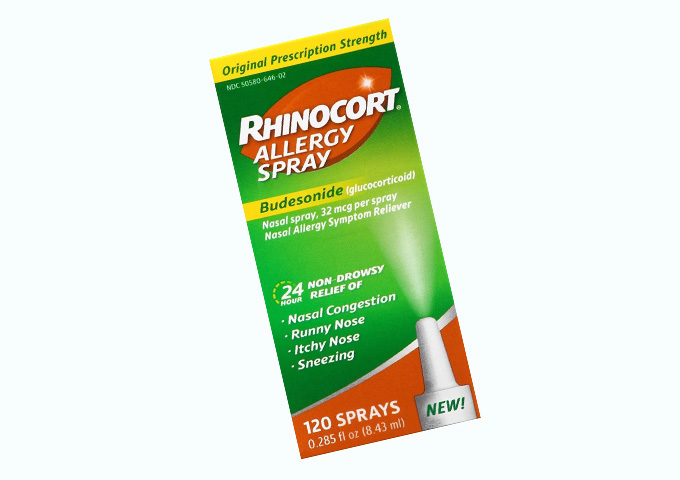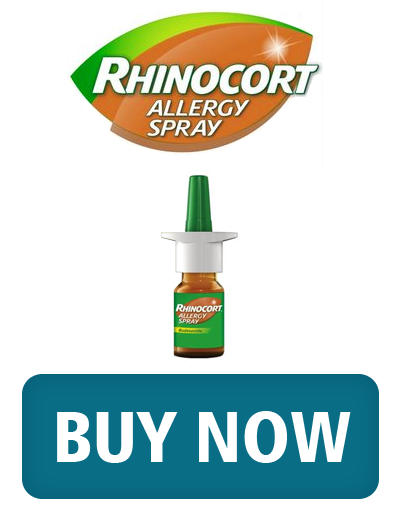Rhinocort (Budesonide)
Rhinocort is a brand name for a nasal spray medication that contains the active ingredient budesonide. Budesonide is a corticosteroid, which means it is a type of anti-inflammatory medication. Medicine is primarily used to treat symptoms associated with allergic rhinitis, commonly known as hay fever.
The medication is administered as a nasal spray and works locally in the nasal passages to reduce inflammation, itching, sneezing, and a runny or stuffy nose caused by allergies. It is particularly effective in alleviating symptoms related to seasonal allergies and environmental triggers, such as pollen, pet dander, dust mites, and mold.
Rhinocort is available over-the-counter in some countries and requires a prescription in others.
Uses
Rhinocort, which contains budesonide, is primarily used to treat symptoms associated with allergic rhinitis, commonly known as hay fever. Some of the main uses include:
- Allergic Rhinitis: Rhinocort is effective in alleviating symptoms such as sneezing, itching, runny or stuffy nose, and nasal congestion caused by seasonal allergies or exposure to environmental allergens like pollen, pet dander, dust mites, and mold.
- Non-Allergic Rhinitis: In some cases, Rhinocort may also be used to treat non-allergic rhinitis, a condition where similar symptoms occur due to irritants like smoke, strong odors, temperature changes, or certain medications.
- Nasal Polyps: Medicine can be prescribed to reduce inflammation and the size of nasal polyps, which are non-cancerous growths that can block the nasal passages and cause breathing difficulties.
- Asthma: In some instances, budesonide, the active ingredient in Rhinocort, may be used as an asthma controller medication to manage and prevent asthma symptoms in patients with mild to moderate persistent asthma.
It's important to note that Rhinocort and similar corticosteroid nasal sprays are meant for regular use to achieve their maximum effectiveness in managing symptoms. However, they may take a few days to start providing significant relief, so it's essential to be patient and consistent with the treatment.

Dosage
The dosage of Rhinocort nasal spray may vary depending on the specific condition being treated and individual patient factors. The following dosage information is a general guideline but should not replace personalized medical advice:
For Allergic Rhinitis (Seasonal or Perennial):
- Adults and Children 12 years and older: The typical starting dose is 64 micrograms (mcg) per day, divided into two sprays in each nostril once daily. If needed, the dose may be increased to 128 mcg per day (two sprays in each nostril twice daily).
- Children 6 to 11 years old: The usual starting dose is 32 mcg per day (one spray in each nostril once daily). The dose may be increased to 64 mcg per day (one spray in each nostril twice daily) if necessary.
For Nasal Polyps:
- Adults: The usual recommended dose is 128 mcg per day (two sprays in each nostril once daily).
- Children: Rhinocort is not recommended for children under 18 years of age for the treatment of nasal polyps.
For Asthma (off-label use):
- The recommended dosage for asthma may differ from the allergic rhinitis dosage. If Rhinocort is prescribed for asthma, the dosing will depend on the severity of the condition and the patient's age. Generally, the dose ranges from 200 to 800 mcg per day, divided into two sprays in each nostril once or twice daily.
- It's essential to use Rhinocort consistently, even if you start feeling better. It may take a few days to experience the full benefits of the medication.
Overdose
If you suspect an overdose of Rhinocort nasal spray or have accidentally used more than the recommended dose, it is crucial to seek immediate medical attention or contact your local poison control center. Overdosing on Rhinocort or any corticosteroid medication can lead to serious side effects.
Symptoms of an overdose may include:
- Severe headache
- Dizziness or lightheadedness
- Nausea or vomiting
- Fatigue or weakness
- Increased thirst or urination
- Rapid or irregular heartbeat
- Muscle weakness or cramps
- Changes in mood or mental status
- Difficulty breathing or shortness of breath
In case of an overdose, do not hesitate to call emergency services or go to the nearest hospital. It is essential to bring the medication packaging or bottle with you to provide information about the active ingredient and dosage.
Precautions
When using Rhinocort nasal spray, there are several precautions to keep in mind to ensure safe and effective treatment:
- Allergies: If you experience an allergic reaction (e.g., rash, itching, swelling, severe dizziness, difficulty breathing) after using Rhinocort, seek immediate medical attention.
- Current Medications: Certain medications may interact with budesonide, and adjustments may be needed.
- Use as Directed: Follow the prescribed dosage and administration instructions carefully. Do not use more or less of the medication than prescribed or use it for longer than recommended. Using Rhinocort for an extended period or in higher doses than necessary may increase the risk of side effects.
- Avoid Contact with Eyes: When using the nasal spray, avoid spraying it directly into the eyes. If accidental eye contact occurs, rinse your eyes thoroughly with water.
- Respiratory Infections: Rhinocort is not intended to treat respiratory infections such as the common cold or flu.
- Growth in Children: Continuous use of corticosteroid nasal sprays like Rhinocort in children may affect their growth. Regularly monitor the growth of children using this medication.
- Tapering Off: If you have been using Rhinocort for an extended period, do not suddenly stop using it. Abruptly discontinuing corticosteroids can lead to withdrawal symptoms.
Side Effects
Rhinocort nasal spray is generally well-tolerated, but like all medications, it can cause side effects in some individuals. Not everyone will experience these side effects, and they can vary in severity. Common side effects may include:
- Nasal Irritation: Mild irritation, burning, or dryness in the nasal passages may occur, especially when starting the medication. These symptoms usually improve with continued use.
- Nosebleeds: Occasionally, Rhinocort can cause minor nosebleeds, particularly if the nasal lining becomes dry or irritated.
- Sneezing: Some people may experience an increase in sneezing initially. This is usually temporary and may improve with continued use.
- Headache: Headaches are a common side effect, but they are typically mild and transient.
- Sore Throat: Rhinocort may cause a mild sore throat in some individuals.
- Bad Taste or Smell: Some users may report a change in taste or smell perception.
- Coughing: In some cases, Rhinocort may trigger mild coughing, especially if the spray is not directed properly.
Serious side effects with Rhinocort are rare, but they may include:
- Allergic Reactions: An allergic reaction to budesonide is possible, though uncommon. Seek immediate medical attention if you experience signs of an allergic reaction, such as rash, itching, swelling, severe dizziness, or difficulty breathing.
- Vision Changes: In rare cases, corticosteroids like budesonide may cause an increase in intraocular pressure, which can affect vision.
- Adrenal Suppression: Prolonged use of high doses of corticosteroids like budesonide may suppress the body's production of natural steroids, leading to adrenal gland issues. This is more likely to occur with long-term systemic corticosteroid use, but it's essential to be aware of this possibility.
- Growth Retardation in Children: Prolonged use of corticosteroids in children may impact growth. Regular monitoring of children's growth is important if using Rhinocort for an extended period.
Storage
Proper storage of Rhinocort nasal spray is essential to maintain its effectiveness and ensure its safety for use. Here are some general guidelines for storing:
- Store at Room Temperature: Keep medicine at room temperature, typically between 20°C to 25°C (68°F to 77°F). Avoid exposure to extreme heat or cold, as well as direct sunlight.
- Keep Away from Moisture: Protect the nasal spray from moisture. Do not store it in the bathroom or any other area with high humidity.
- Store Upright: Keep the bottle of Rhinocort in an upright position to prevent leakage or spills.
- Keep Out of Reach of Children: Store nasal spray in a location where children cannot access it. It is essential to keep all medications out of their reach to prevent accidental ingestion.
- Check Expiration Date: Always check the expiration date on the package. Do not use Rhinocort after the indicated date, as the medication may lose its potency or become unsafe.
- Properly Dispose of Expired or Unused Medication: If you have expired or unused Rhinocort nasal spray, follow your local guidelines for medication disposal. Do not flush it down the toilet or pour it down the drain unless instructed to do so.
If you have any specific storage instructions provided with your Rhinocort nasal spray, follow those recommendations.
